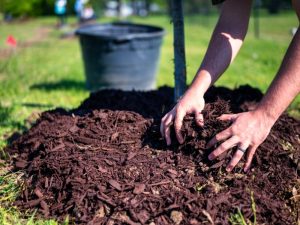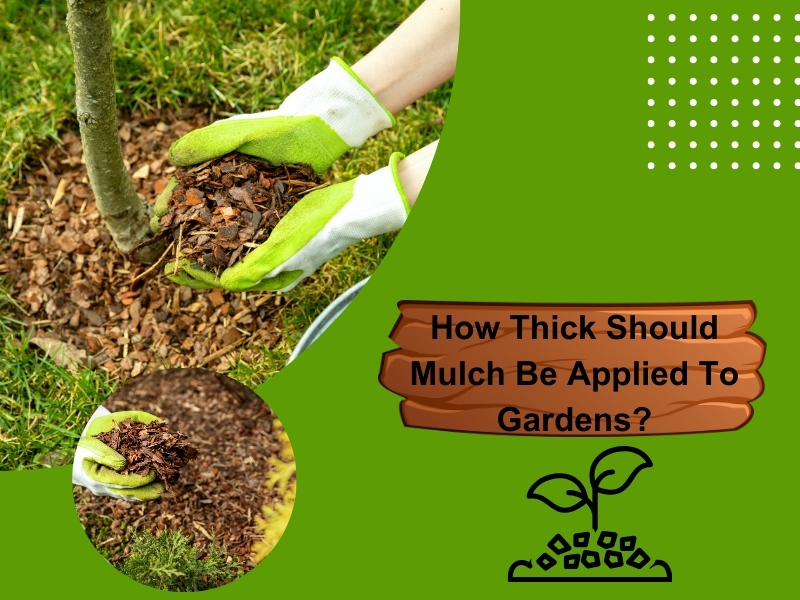Mulch plays a crucial role in maintaining a healthy garden by enhancing soil fertility, improving moisture retention, and helping to control weeds. However, not all mulch applications are created equal. The thickness of the mulch layer you apply can significantly impact the success of your garden. But how thick should it be? This article will explore the importance of mulch thickness, the factors that influence its ideal depth, and how it affects various aspects of your garden’s health, especially in Sydney’s unique climate.
Why is mulch thickness important for garden health?
Mulch serves multiple purposes in a garden. The proper thickness ensures that your plants thrive by providing the following benefits:
- Soil moisture retention: Mulch helps reduce evaporation, keeping the soil moist for more extended periods.
- Temperature regulation: It provides insulation, keeping the soil cooler during hot summer days and warmer in cooler weather.
- Weed suppression: A thick layer of mulch prevents sunlight from reaching weed seeds, stopping them from germinating.
- Soil enrichment: Organic mulches decompose over time, adding nutrients back into the Soil.
- Protection from erosion: Mulch helps prevent soil erosion, particularly during heavy rain events.
What factors determine the ideal mulch thickness?
Several factors determine the ideal thickness of mulch for your garden:
- Plant type: Different plants, like flower beds, vegetables, and trees, require varying mulch thicknesses.
- Climate: Sydney’s hot summers and mild winters require mulch that retains moisture in summer and insulates in winter.
- Soil type: Sandy soils need a thicker layer to prevent drying, while clay soils require a thinner layer to avoid waterlogging.
- Mulch type: Different mulches decompose and retain moisture at varying rates, affecting thickness.
How does mulch thickness affect soil moisture retention in Sydney’s climate?
Sydney’s climate can be hot and dry during the summer months. Mulching for a water-efficient garden is an effective way to maintain soil moisture and reduce water usage. Here’s how mulch thickness plays a role:
- Retains moisture: A thick mulch layer (around 7-10 cm) helps maintain moisture by reducing evaporation from the Soil, ensuring your plants have a steady supply of water during dry periods.
- Prevents soil drying: During the scorching summer months, a thick mulch barrier can keep the soil cool and moist, preventing it from drying out too quickly.
- Water conservation: In areas with water restrictions, using the right mulch thickness is essential for reducing the need for frequent watering.

Should mulch thickness be adjusted based on seasonal changes?
Mulch requirements can vary depending on the season. Adjusting the thickness of the mulch layer based on Sydney’s seasonal changes ensures your garden stays healthy year-round:
- Summer: A thicker mulch layer (7-10 cm) retains moisture and keeps soil cool.
- Autumn: Reduce thickness slightly for better air circulation and to prevent fungal issues.
- Winter: Increase mulch depth to protect plant roots from frost.
- Spring: Refresh mulch to maintain moisture retention and suppress weeds.
What thickness of mulch helps reduce weed growth effectively?
One of the primary reasons for applying mulch is to suppress weed growth, which competes with your plants for nutrients and water. The thickness of the mulch layer directly impacts its effectiveness:
- Ideal Thickness for Weed Suppression: A 5-10 cm layer of mulch is typically recommended for effective weed control with mulching. This thickness blocks sunlight from reaching weed seeds and prevents them from germinating.
- Types of mulch for weeds: Organic mulches like bark and wood chips, along with inorganic options like gravel, provide excellent weed barriers.
- Long-term benefits: A thick mulch layer reduces weeding time and effort, allowing you to focus on other garden tasks.
How can you ensure the right mulch thickness around trees and shrubs?
When mulching around trees and shrubs, ensure the thickness is right—too much can damage roots, and too little will not help.
- For trees: Apply mulch at a 7-10 cm depth, creating a doughnut-shaped ring around the base and leaving a gap from the trunk.
- For shrubs: Apply mulch at 5-7 cm, covering the root zone but not touching stems to prevent moisture buildup.
- Mulching tips: Spread mulch evenly and maintain consistent depth to ensure even moisture distribution.
What are the benefits of maintaining optimal mulch depth for water conservation?
Sydney’s water restrictions make water conservation a priority for many gardeners. Mulch thickness is a simple yet effective way to reduce water usage:
- Minimises evaporation: The correct mulch thickness (7-10 cm) helps retain moisture in the Soil, reducing the need for frequent watering.
- Increased soil health: Organic mulches enrich the Soil as they break down, improving its ability to retain water and provide nutrients to plants.
- Reduced runoff: Mulch helps prevent water runoff during heavy rain, allowing water to be absorbed into the Soil rather than washing away.
By ensuring your mulch is the correct thickness, you can significantly conserve water with mulch alternatives while promoting a healthier garden.

Does mulch depth impact pest control in your garden?
Mulch can play a role in pest control by either attracting or deterring certain insects. The proper thickness can help manage garden pests effectively:
- Insect habitat: a thick mulch layer can create a relaxed, damp environment that may attract pests like slugs and snails. However, this can be mitigated by using specific mulch types (e.g., pine bark) or by regularly refreshing the mulch.
- Beneficial insects: Properly applied mulch can also provide a habitat for beneficial insects like earthworms, which can help improve soil health.
- Pest deterrents: Certain mulches, like those made from cedar, can naturally repel pests due to their aromatic oils. This makes them a good option if you’re concerned about pest infestations.
Creating the perfect garden with mulch
In conclusion, understanding the importance of proper mulch thickness is vital to a healthy garden. The correct depth enhances moisture retention, weed control, pest management, and plant health, especially in Sydney’s climate. Seasonal adjustments and careful consideration of plant type, soil, and mulch material will optimise its benefits. With the right mulch thickness and professional mulching services, you’ll promote water conservation, improve soil health, and keep pests at bay, ensuring your garden flourishes with minimal effort.
At A1 Gardening & Landscaping Sydney Sydney, we offer local expertise and personalised services to create your dream garden. From routine maintenance to complete redesigns, our team tailors solutions to your needs and budget. With a focus on sustainability and eco-friendly practices, we help your garden thrive. Contact A1 Gardening & Landscaping Sydney Sydney today for a consultation, and let’s make your outdoor space flourish!



